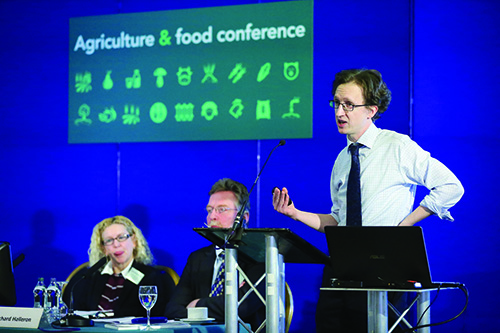Forward contracts have a role to play within agriculture
 Long-term supply agreements could help mitigate the agri-industry’s market volatility problems.
Long-term supply agreements could help mitigate the agri-industry’s market volatility problems.
According to AFBI economist Myles Patton opportunities now exist to establish long-term contract supply arrangements within the farming and food sectors. These opportunities would be price focussed and could be used to mitigate the impact of market volatility at farm level.
He confirmed that a combination of poor weather, a growth in biofuel production and increasing energy prices helped create a spike in world cereal prices during the years 2007 and 2013.
“However, better weather, a slowdown in biofuel production growth plus a fall in energy prices had led to a complete reversal in market fortunes during 2009,” he said. “This is volatility in action. However, we are also seeing a tremendous variability on world dairy commodity markets. Prices have doubled in the last decade, compared to the previous 10 years”.
Patton explained the relevance of the Food and Agricultural Policy Research Institute (FAPRI) UK modelling system, hosted by AFBI in the United Kingdom, which captures the dynamic interrelationships among the variables affecting supply and demand in the main agricultural sectors of England, Wales, Scotland and Northern Ireland.
“The model consists of a system of equations covering the dairy, beef, sheep, pigs, poultry, wheat, barley, oats, rapeseed and biofuel sectors,” he said. “The AFBI system partners with the modelling work carried out by economists at the University of Missouri in the United States. When combined, both systems provide a systematic framework that takes account of interactions among the agricultural sectors in regional, EU and World markets.
“The models generate annually-determined, 10-year baseline projections of all the major agricultural commodity prices, production levels and greenhouse gas emissions, against which policy scenarios can be compared. Baseline projections provide a benchmark against which projections derived from policy scenarios can be compared and interpreted.
“The modelling system is then further simulated with changes to policy variables and the results are compared against the baseline to isolate these policy effects across the ten-year projection period”.
The model incorporates variables representing the major policy instruments associated with the EU CAP, as well as external trade commitments made by the EU. These policy variables can be altered to run scenarios for the purposes of policy analysis as agreed by the project management board.
Patton explained that FAPRI modellingcan be used to explore revenue variability in different regions.
“This work is showing that there may be a greater need for risk management tools within the peripheral food producing regions of the UK, such as Northern Ireland,” he said.
“Policies, designed to cope with volatility include the encouragement of on-farm diversification, the introduction of decoupled direct payments, the application of new financial instruments, taxation changes, forward contracts and the development of futures markets that are directly relevant to the commodities produced here in Northern Ireland.”
The AFBI economist pointed out that forward supply contracts at farm level must take account of both outputs and inputs. “In essence, the farmer and buyer agree the quantity and price of output in advance,” he said. “This then allows the producer to factor-in an accurate farmgate price for an agreed period of time.
“Where inputs are concerned, forward contracts serve to lock-in costs of production. Under an averaging arrangement the farmer commits to buy a proportion of the feed required by the business at regular intervals.
“When used in this way, forward contracts can allow primary producers to fix margins. Commenting on the relevance of futures markets for local farmers, Patton said that they represent legal contracts negotiated at a futures exchange.
“These then act as intermediaries between the buyer and seller,” he said. “Futures markets for grains are well established in the EU, but less so for other commodities. Recent attempts have been made to revamp dairy futures in butter, skimmed milk and whey. But these will require the establishment of independent and fully auditable prices.”





